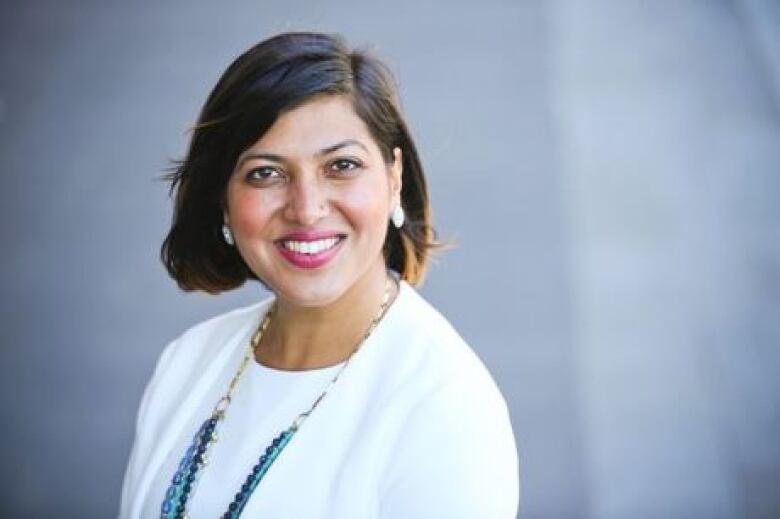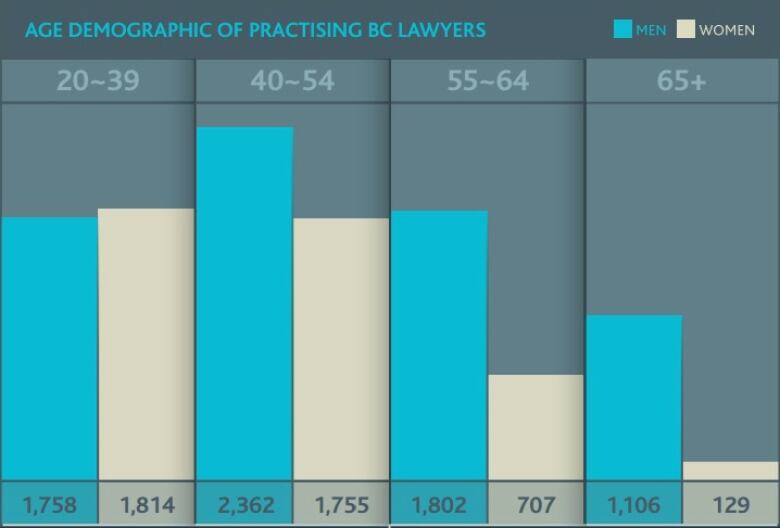Recognition matters as much as numbers in the 'boys club' of law, say women lawyers
This week Constance Isherwood was the first female lawyer conferred with a lifetime achievement award in B.C.

From potential employers asking about her marital status to male colleagues subtlydisrespecting female judges, it wasn't easy for Vancouver lawyer Sonali Sharma to find her place in the profession.
She now works at aboutique familylaw firm but it took three years of articling and working before the 32-year-old found a workplace whereshe felt valued.
"The legal profession is often seen as a boys' club," Sharma said.
That's whySharma says shewasn't surprised by the fact that 96-year-old Constance Isherwood was the first woman to be given honoured with a lifetime achievement awardin the 30 years the B.C. Law Societyhas conferred it.

Provincial law societies across the country have documented and discussed the fact that women are less likely to stay in the profession because of factors that range from long hours incompatible with child-rearing to the proverbial glass ceiling.
But according to some lawyers, the same workplace culture that subtly encourages women to leave is also less likely to recognize them for the areas of the practice they do thrive in.
'Traditional definition of success'
"It's incredible in 2016 that there's any lifetime achievement award in any profession that has never honoured a woman," said Kasari Govender, executive director of feminist advocacy group West Coast LEAF.
"But it is particularly surprising in a profession where there are many, many women practising."
Numbers from the Law Society of B.C. do show that women make up nearly 40 per cent of practising lawyers in the province.
But Govender says they don't flock to large, corporate firms in the same way that men do even though that's the work traditionally seen as "successful" in the profession.
"Yes, there may not be as many women partners in large firms, but there are women doing all kinds of interesting and really important legal work that doesn't look like that traditional definition of success," Govender said.

A large part of the issue in thosefirms, Govender says, is the expectation of sacrificing one's personal life to rake in billable hours and attract new business.
Govender says, for various reasons, many female lawyers make their way to senior levels of government, non-profit companies and other organizations working on public policy and constitutional law.
Still, many lawyers acknowledge that the law profession has come a long way in the past few decades, thanks in part to the work of projects like the Justicia project.
Encouraging progress
Justicia began in Ontario and made its way to B.C. in 2012as a way to encourage the retention and recruitment of women in the profession.
Andrea Hilland, a staff lawyer with the Law Society of B.C. responsible for the project, says in 2015 women outnumbered their male counterparts in B.C. law schools and were called to the bar just as often.
It's a far cry from Isherwood's time, when she was one of onlyeight women in a group of 200 law school graduates at UBC.
Hilland says large firms are signing on to Justicia's commitments to promote and retain women lawyers, including implementing more inclusive parental leave options.
"That's a huge thing 25 years ago, most firms didn't have very womenpractisingand therefore didn't have policies,"Hillardsaid. "Now that's par for the course."

DavidCrossin, president of the B.C. Law Society, agrees it's been "far too long" a wait to give the award to a woman.
But he saysIsherwood'saward traditionally goes to people with long careers in the profession, and there simply aren't as many women left at that top end of the demographic.
There have always been a lot more men participating inthis profession, particularly as their careers advance,"Crossinsaid.
"The math just always ends up being that there are a lot more men applying than women."
Fighting for recognition
Despite someadvances, womenlawyers like Govender and Sharma say more needs to be done to recognizewomen in the profession.
"If we're not honouring the women who are incredibly successful in the profession until 30 years of awarding people with lifetime achievement awards, what does that say to young women entering the profession?" Govender said.
Sharma who was called to the bar in 2014 seems to have the answer to that question.
"It just seems like any [female] judge or lawyer that I've talked to, they've had to work so much harder like, 10 times harder than their male counterparts to get the type of recognition that they're getting," she said.
"Frankly, that's bullshit."












_(720p).jpg)


 OFFICIAL HD MUSIC VIDEO.jpg)
.jpg)



























































































